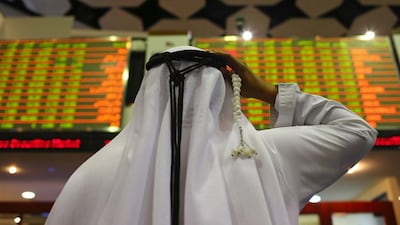Nasdaq Dubai and the Dubai Financial Market (DFM) will this year launch futures contracts linked to the DFM General Index (DFMGI) that will trade on Nasdaq Dubai's equity futures market, in a move aimed to expand the exchanges' offerings to investors.
“Subject to regulatory approval, trading of DFMGI futures is expected to begin later this year with the support of leading UAE brokers, targeted at professional and institutional investors to enable them to take a macro view on the DFM market,” the exchanges said in a joint statement.
Nasdaq Dubai last year launched single-stock equity futures that now feature 13 companies, including eight traded on the DFM.
“The diversification of products’ range and offering new investment opportunities to our enormous investor base is one of the main pillars of DFM’s strategy 2021,” said Essa Kazim, chairman of DFM.
“We believe that the launch of futures on the DFMGI will be a milestone in the development of Dubai’s financial landscape by offering versatile products that are tailored to the needs of international as well as regional investors.”
______________
Read more:
Abu Dhabi bourse introduces technical short-selling
Dubai stock market targets short-selling by year end
______________
Nasdaq Dubai, which launched the futures market last September, has had a surge in traded contracts volume, which jumped 80 per cent to 1.57 million contracts in the six-month period ending August 31 compared with 874,000 contracts in the first six-month period.
“The addition of a DFMGI-linked product to Nasdaq Dubai’s equity futures represents a substantial expansion of the market and widens the opportunities for investors who wish to hedge or invest, as well as make gains whether the value of the index is falling or rising,” said Hamed Ali, chief executive of Nasdaq Dubai.
“The two exchanges will further increase their co-operation in order to make Dubai a leading international centre for trading and clearing a wide range of equity derivatives.”
The new instruments are expected to attract a range of investors from retail to institutional investors, according to Julian Bruce, the head of institutional trading at Egyptian investment bank EFG Hermes in Dubai.
“There is a an underlying interest and demand from a variety of different investors to be able to access such products in the UAE, so it’s a positive development,” said Mr Bruce.
“There is an ongoing increase in the usage of derivatives by regional-based institutions and so it will only continue to grow and once clearing capabilities are introduced for DVP [delivery-versus-payment], clients then international institutions of a variety of types will be also able to participate.”
DVP means the payment settlement system provides a mechanism to ensure that delivery of securities will occur only if payment for such securities has been cleared.
Nasdaq Dubai has been expanding its remit to help attract more investors and diversify its offerings.
The exchange signed a licence agreement with the index complier MSCI to use its widely-tracked regional indexes to create derivative products to be traded on Nasdaq Dubai’s derivatives platform.
The DFM also yesterday reiterated its plans to launch regulated short-selling to boost liquidity in stocks and equity futures, but declined to give a timetable.
The Abu Dhabi Securities Exchange last week introduced a limited form of short-selling for 10 stocks including FAB, the country’s biggest lender, the telecoms operator Etisalat, the lender Abu Dhabi Commercial Bank and the developer Aldar Properties.

